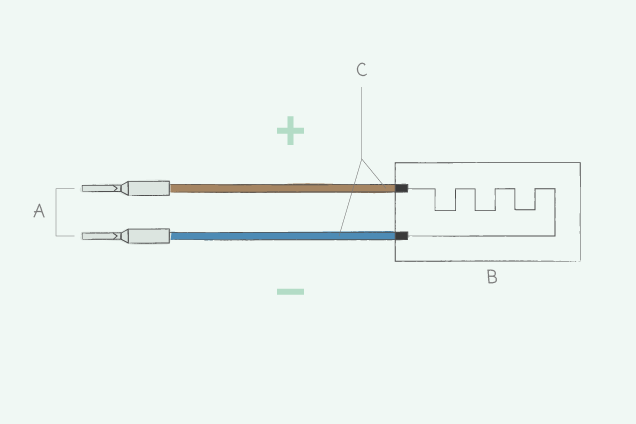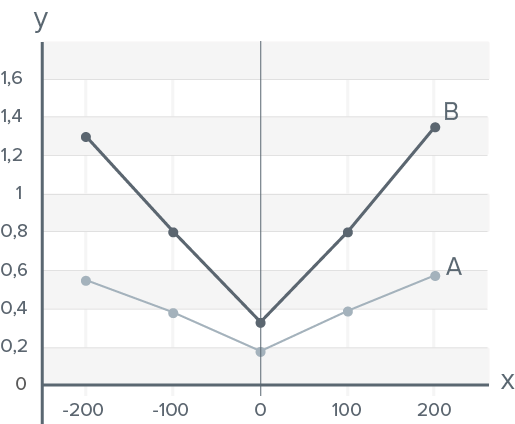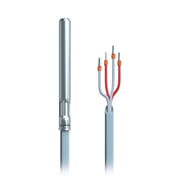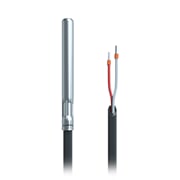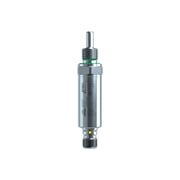Temperature-dependent resistor
Platinum measuring resistor
A platinum measuring resistor is a resistance thermometer used to measure temperature. The most commonly applied platinum resistance thermometers are Pt100 and Pt1000. The designations Pt100/Pt1000 describe the resistor material involved, in this case platinum, and its nominal resistance R0 at a temperature of 0 °C. (R0,Pt100 = 100 Ω / R0,Pt1000 = 1 kΩ). Usually Pt100 and Pt1000 are used, although other resistance values are possible.
Resistance thermometers: Design
A platinum resistance thermometer consists of an electrical resistance of platinum. Platinum is often used for temperature changes due to its constant electrical properties. The resistor is connected to the connecting wires by an electrical conductor. The components are protected against external influences by a protective housing and appropriate insulation.
Resistance thermometers: How they work
A constant current flows via the connecting cables through the resistance thermometer. An electrical voltage is measured between the two connecting cables which depends on the platinum resistance. The linear correlation between the electrical resistance of the platinum conductor and the temperature is used to measure the temperature. If the temperature rises, so too does the electrical resistance. As a result, a different voltage is also measured between the conductors, which is used to calculate the temperature.
Converting Pt100/Pt1000 resistance into temperature

The linear correlation between the electrical resistance of the platinum conductor and the temperature is used to measure the temperature.
Patrick Targonski, Product Manager at autosen


Resistance thermometer characteristic curve
he characteristic curve shows the linear relationship between electrical resistance and temperature. Exact values for Pt100 and Pt1000 can be determined graphically from the Pt100 characteristic curves / Pt1000 characteristic curves or read directly from the Pt100 table / Pt1000 table. Platinum is highly suitable as a material due to its high long-term stability and particularly constant electrical properties at high temperatures. Thus, the characteristic curve for platinum resistors is very linear even at high temperatures. By adding other impurities to platinum, even better results are achieved in this respect.
Pt100 Kennlinie
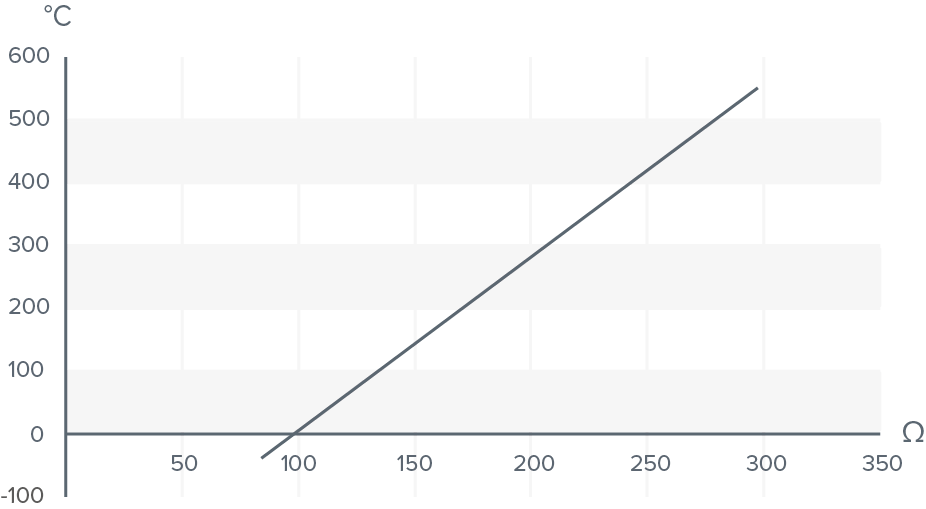
Pt100 characteristic curve
Pt1000 characteristic curve

Resistance table Pt1000
Which is more accurate? Pt100 or Pt1000?
The platinum resistors Pt100 and Pt1000 are offered in both tolerance class A and tolerance class B. This raises the question of which temperature sensor is more accurate. Tolerance class A is more accurate than tolerance class B. However, a Pt100 measuring resistor boasts similar measuring accuracy to a Pt1000 sensor of the same tolerance class. Nonetheless, both temperature sensors have different susceptibility to measuring errors, which is discussed in the following sections.
Influence of conductor resistance on accuracy
The temperature measurement with Pt100/Pt1000 is achieved through a change in electrical resistance. Other electrical resistances, such as the resistivity of connecting cables, have a negative impact on the measuring accuracy of the temperature measurement. The resistance depends on the material (usually copper), the length and the cross-section of the cable. The order of magnitude of the measuring error is shown using the example of a 50 m cable with 2-wire measurement.
If a Pt100 sensor is connected to the electronic measuring equipment via a 50 m cable, the actual measured resistance is 5.25 Ohm higher due to the conductor resistance, which obviously affects the temperature measurement. Each ohm of resistivity results in a measuring error of approx. 2.5 Kelvin. This results in a measuring error of approx. 13 °C. The resistance of a Pt1000 resistor is ten times greater than that of a Pt100 sensor, meaning the influence of the electrical conductor is ten times smaller. As explained in the example, the measuring error can be calculated and deducted from the actual measurement result. Alternatively, another measuring circuit can be used to compensate for the error.

Rule of thumb: “Each ohm of resistivity results in a measuring error of approx. 2.5 Kelvin.”
Patrick Targonski
Product Manager at autosen
Selection of temperature sensors
 Cloud compatible
Cloud compatible 50+ in stock!
Online -5,5 %
109.41 €
103.39 €




